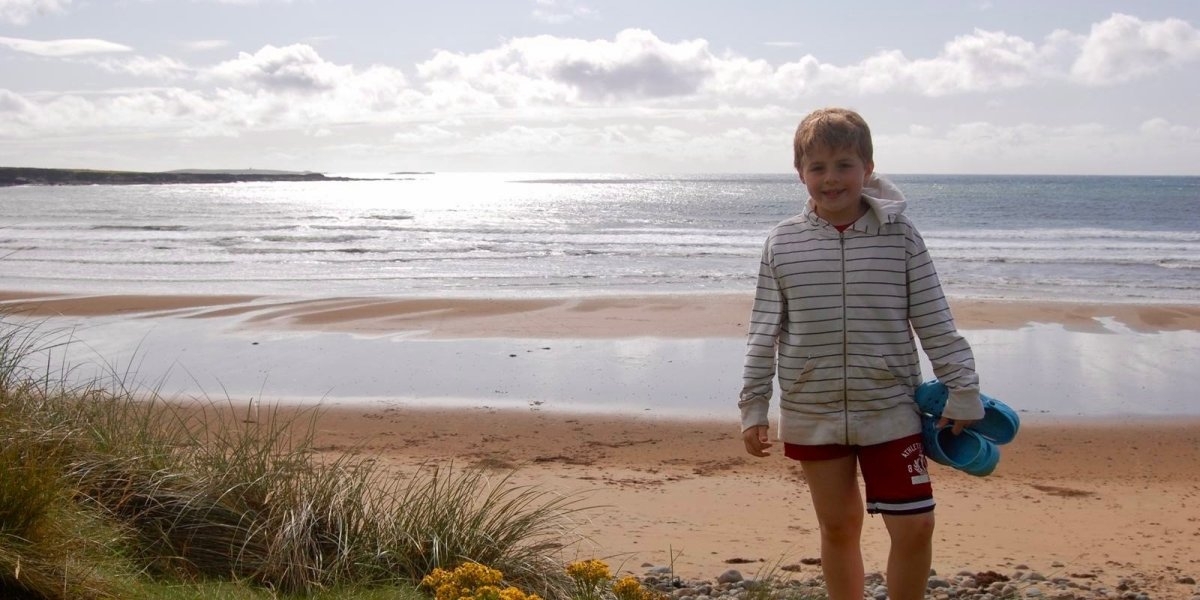Family Holiday in Lahinch, Ireland, 2010. Photo: Private
Layovers and Lessons: A Student’s View on Flying Less
I grew up in Ireland, where the isolation of island life combined with being the home of Ryanair, made flying feel less like a luxury and more like a rite of passage.
Conor John
Cheap flights became a normal part of life—an escape from the edge of Europe and a way to stay connected to the wider world. My means of travelling abroad have developed and shifted throughout the years. With half of my family in the UK, an annual ferry trip across the Irish Sea was a regular occurrence. While I have fond memories of visiting my family there, the UK never felt especially exciting to me; its similarities to Ireland made it feel familiar, and I often found myself wanting more. My summers usually consisted of trips outside Europe, largely shaped by my parents’ ideas of what constituted a good trip. My father had maintained his travelling bug from his younger days, when he had backpacked around Asia and road-tripped the U.S. This influence definitely rubbed off on me. From a young age, I was subtly told that domestic holidays (staycations) or even popular holiday locations like Spain or Portugal were somehow less interesting than Asia or the Americas. In retrospect, I never personally felt this, and as most children do, I took my parents’ word as gospel.
I’ve had some fantastic local holidays in Ireland, so it’s hard to say whether my sense of well-being with holidays came from actually travelling abroad or from my parents’ belief and attitude that going abroad was somehow better.
The two years between leaving secondary school and COVID were filled with travel. What I observed then and what I still notice now is that the satisfaction my demographic (budget-conscious students) derives from air travel is largely correlated with how cheap they can get the flight. I’ve seen friends go on 10-day holidays with only a Ryanair underseat bag, or personally done desperately long layovers to save some money. Similarly, I’ve had friends and classmates opt for 12-hour buses instead of flying, purely as a money saver. Of course, once people settle into their careers and have a stable income, they’re more likely to choose efficiency over budget travel. However, for students, the need to save money plays a crucial role in deciding whether to fly or not.
Before studying sustainability, I rarely, if ever, considered the environmental impact of my air travel. My best travel experience by far was interrailing around Europe with friends and staying in budget hostels. The ruggedness of the journey really brought us together, and sometimes, the train rides themselves were the highlight. Having time to chat, play cards, and take in the scenery made the experience ten times better, and the trip wouldn’t have been the same if we had taken planes. I think the discourse around interrailing and long train journeys being 'gritty' or 'unrefined' contributes to it being primarily associated with young travellers, rather than corporate businessmen.
Improvised sleeping arrangements after forgetting to book a sleeper cabin. Photo: Private
In the past nine months, I’ve flown only once. This period has coincided in part with my growing interest in ancient philosophy, which has taught me valuable lessons about detaching my well-being from external factors like holidays or flying, to some extent. Although it’s still very much a work in progress, it’s been a great mental exercise. The Roman philosopher and statesman Seneca the Younger wrote in his letters: “Are you amazed to find that even with such extensive travel, to so many varied locales, you have not managed to shake off gloom and heaviness from your mind? … You must change the mind, not the venue.” Similarly, the Stoic philosopher Musonius Rufus once said, “We do not feel the lack of many things unless we wish to live luxuriously”—a reminder that much of our desire for frequent air travel may stem more from habit or luxury than genuine need.
These 2000-year-old teachings are still super relevant today, yet sometimes easier said than done. Reflecting on what genuinely gives me satisfaction and what is just some external thing that society says is good has been very helpful for me. I have lived abroad in three different countries, for periods ranging from six months to one year, often not finding what I was looking for. Similarly, I’ve gone on holidays that I hyped up beforehand, only to look back and feel slightly annoyed I didn’t just stay home and save money. In short, I’ve realised that what I do in a given place, such as adding value, maintaining good relationships, and staying active, often matters more for my well-being than simply my surroundings. Although I acknowledge this could be an example of adaptive preference—where we adjust our values to fit our circumstances—I still believe the fact that I haven’t flown much recently is meaningful. That said, my perspective might be shaped by my limited budget for flying, so my view may reflect my situation more than a purely ethical stance.
For now, I will continue to reflect on my flight habits, likely limiting it to one or fewer holidays per year and looking for more sustainable solutions, such as ferries and trains, when possible. As sustainable travel options evolve, I believe the ethical dilemmas surrounding travel will gradually become less pressing. For now, though, I’ve started to reflect on my habits and consider what changes I might make at home, rather than rushing to book a trip that could add to carbon emissions and distract me from deeper, more meaningful work.
This blog is part of the research project FLYWELL
